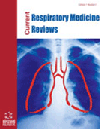-
s Antibiotic Therapy of Pneumonia in Critical Care
- Source: Current Respiratory Medicine Reviews, Volume 8, Issue 3, Jun 2012, p. 228 - 238
-
- 01 Jun 2012
Abstract
The effective treatment of pneumonia in a critical care setting involves optimal administration of antibiotics. Various micro-organisms are responsible for causing pneumonia. As the pathogen may not always be evident, empiric broad spectrum antibiotic regimens are often used. There are various resources available to guide antibiotic therapy but unfortunately these have not been validated in critically ill patients. Of increasing concern, multidrug resistant bacteria are becoming more prevalent in the critical care units causing a paradigm shift for antibiotic therapy. In the context of a diminishing pipeline of antibiotic development, optimal use of available antibiotics is essential. Alternative modes of administration such as aerosolisation should be considered especially in nosocomial, multidrug resistant organisms. Further to this, de-escalation of antibiotics and antibiotic cycling are some of the strategies that can be utilised to reduce the emergence of multidrug resistant bacteria. Improvement of clinical outcomes for pneumonia in critical care may also be achieved through use of therapeutic drug monitoring and combination therapy. We advocate that the rational development of local antibiograms for critical care units to better guide the empiric antibiotic therapy in these patients.


